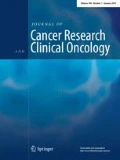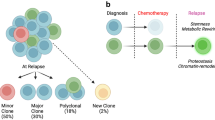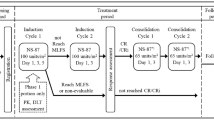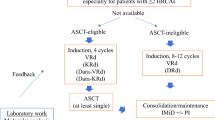Abstract
Bendamustine, an alkylating agent without cross-resistance to cyclophosphamide is active in a variety of lymphoproliferative and other malignancies. In an open phase-II study we treated 23 patients with a median age of 62 years at study entry (43–86 years) with advanced, refractory or relapsed (Rai stage III n=9, Rai stage IV n=14) chronic lymphocytic leukemia (CLL) with bendamustine. At study entry, only 13 patients were chemotherapy-naive. The treatment schedule with bendamustine was as follows: for patients up to 70 years 60 mg/m2 for 5 days, for patients over 70 years 50 mg/m2 for 5 days, repetition at day 29. Remission criteria were used according to Cheson et al. (1996). All patients were evaluable for toxicity and 20 for response. An objective remission was achieved in 15/20 patients (75%), including six patients with complete remission (CR). Three of the complete responders had no chemotherapy prior to bendamustine. No change (NC) occurred in 5/20 patients (25%). Median overall survival after bendamustine treatment is 13.6 months (1–46 months) and 16.6. months (1–46 months) in patients responding to bendamustine. In total, 74 courses of bendamustine were applied. Therapy-related anemia and thrombocytopenia were rare. However, WHO grade III/IV leukocytopenia occurred in 38/74 cycles (51%), resulting in treatment-related mortality in 3/23 patients (13%). These patients were severely immunocompromised due to pretreatment or the underlying disease. As a corollary of the study, a general prophylactic antibiotic treatment (trimethoprim/sulfamerazine) was instituted. A general feature was the decline of the CD4/CD8 ratio: mean before therapy: 1.36; after two courses: 0.98; after four courses: 0.6, as documented in all patients who received at least two courses of bendamustine (n=12). All evaluable patients showed a decline in the CD4/8 ratio. However, this decline was not clearly related to an increased risk of infectious episodes. We observed mainly cutaneous allergic reactions (three WHO grade I; one WHO grade II) leading to a cessation of bendamustine treatment in 4/23 patients (18%). Bendamustine is highly effective in advanced or refractory CLL. In multiple pretreated or otherwise severely immunocompromised patients bendamustine might lead to additional immunosuppression with subsequent infectious complications.
Similar content being viewed by others
Author information
Authors and Affiliations
Additional information
Received: 25 May 2000 / Accepted: 30 June 2000
Rights and permissions
About this article
Cite this article
Kath, R., Blumenstengel, K., Fricke, H. et al. Bendamustine monotherapy in advanced and refractory chronic lymphocytic leukemia. J Cancer Res Clin Oncol 127, 48–54 (2001). https://doi.org/10.1007/s004320000180
Issue Date:
DOI: https://doi.org/10.1007/s004320000180




